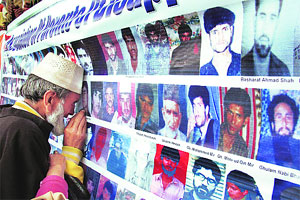Special News
Systematic Practice of enforced disappearance: Now mass graves are found in South Kashmir too
November 8, 2011 | By Sikh Siyasat Bureau
Srinagar/Kashmir (November 8, 2011): The issue of secret killings during enforced disappearance of civilians in Kashmir by Indian Security forces is has now begin to come in to light. Mass graves are now reported to have been found in Bindu-Kokarnag area of South Kashmir. Auqaf Committee is reported to have confirmed the presence of several unidentified graves, according to various media reports.
Similar issue was unearthed in Punjab by Jaswant Singh Khalra, a human rights activist of Punjab who was soon after subjected to enforced disappearance and was killed by Punjab Police. JS Khalra brought documentary evidences of secret cremations being carried as a part of systematic and wide spread unlawful practice. In Punjab this practice was carried by both “disciplined” armed forces, (including police, army and para-military forces of India) and “undisciplined” armed groups operating under state patronage, whose operations were supervised by senior officers of Armed forces. These notorious undisciplined armed groups included “Black Cats”, Alam Sena and Virk Sena. Indian supreme court has accepted at least 2097 illegal cremations by armed forces in just three cremation grounds of Amritsar, which is one of the twenty districts of Punjab, while rest of the issue remains un-investigated till date.
As far issue of unidentified graveyards in Kashmir is concerned according to the report, the local Auquaf committee says there could be more than 70 unmarked graves in the cemetery. For several years, body bags continued to pour in until the graveyard was filled to capacity, reports Kashmir Watch.
A “Daily News and Analysis” (DNA) news report, states, “Zubair Ahmad points at the mud-covered graves. He is jittery – playing in his mind are flashbacks from the day in the mid-’90s when security forces handed over three charred half-bodies to the local Auqaf Committee for burial.”
 Ahmad, who was in his early 20s then, witnessed the burial, in the village graveyard, of unidentified bodies of alleged ‘militants’. The graveyard gradually became the resting place for more and more unidentified bodies brought there by the security forces.
Ahmad, who was in his early 20s then, witnessed the burial, in the village graveyard, of unidentified bodies of alleged ‘militants’. The graveyard gradually became the resting place for more and more unidentified bodies brought there by the security forces.
“From the mid-’90s to the early 2000s, security forces and the police brought bodies in vans for burial in the graveyard,” the report quotes Zubair as saying. “Once, five boys who looked like they were teenagers were brought for burial.”
“It used to be a village graveyard,” says Molvi Bashir Ahmed, the Mirwaiz of Jama Masjid and chairman of the central Auqaf Committee. “Since Bindu village is central in the Breng area, and the police station is nearby, the bodies were handed over to us. We, as Muslims, thought it was our religious duty and buried them in the local graveyard.”
Bindu is a strategically located, with Kishtwar in Jammu region on one side and Anantnag on the other.
“We were told that these bodies belonged to unidentified militants. But we did not know who they were. People from different areas, including Kishtwar, came to us enquiring whether any of their kin were buried in the graveyard. We referred them to the police station, telling them that cops might have photographs of the dead,” says Molvi Bashir.
South Kashmir has, so far, remained insulated from the unmarked graves controversy, even as north Kashmir remains in the limelight after the investigative wing of the State Human Rights Commission (SHRC) found 2,156 unidentified bodies buried in 38 graveyards across three districts.
Jammu and Kashmir minister of state for home, Nasir Aslam Wani, said he will look into the matter of unmarked graves in south Kashmir. “I have to check this. Since you told me, I will look into this,” he said.
Defence spokesman Lt Col JS Brar refused to comment
on this issue. Human rights groups say this only proves that no district is free from the unmarked graves. “The fact of the matter is that no district in Kashmir is free from unmarked graves,” said Khurram Parvez, Liaison International People’s Tribunal on Human Rights and Justice (IPT), and programme coordinator, Jammu and Kashmir Coalition of Civil Society.
IPT had come out with a report titled ‘Buried Evidence’, documenting 2,700 unknown, unmarked, mass graves, containing 2,943 bodies, across 55 villages in Bandipora, Baramulla, and Kupwara districts of Kashmir. The report was based on research conducted
from November 2006-November 2009.
The IPT report was the second, and comes on the heels of J&K Coalition of Civil Society report in 2008 about nameless graves. Titled ‘Facts Under Ground’, the report detailed 940 to 1,000 nameless graves of unidentified slain people.
“I remember chief minister Omar Abdullah telling people to come forward for DNA testing. But nobody came forward,” says Mustafa Kamaal, additional general secretary and spokesman of the ruling National Conference.
To Get Sikh Siyasat News Alerts via WhatsApp:
(1) Save Our WhatsApp Number 0091-855-606-7689 to your phone contacts; and
(2) Send us Your Name via WhatsApp. Click Here to Send WhatsApp Message Now.
Sikh Siyasat is on Telegram Now. Subscribe to our Telegram Channel
Related Topics: Enforced Disappearance, Human Rights, Jammu and Kashmir, Kashmir Killings




